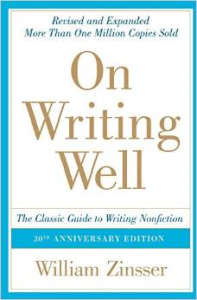On May 12, 2015, the writing world lost a great encourager, teacher, and mentor. At age 92, William Zinsser passed away. Author of the book that is (or should be) on the shelf of every writer and editor, On Writing Well, Zinsser left a legacy of helping people learn how to put words together. On Writing Well was first published in 1976 and has gone through seven editions as Zinsser updated it to take into account new technologies.
The focus of the book is writing nonfiction, but the principles of good writing span all genres. Simplicity, economy of words, style, usage, voice, and understanding one’s audience are important for every type of writing–from the business email to the fantasy novel.
Zinsser spent his career writing and teaching writing. During the 1950s, he wrote editorials and features for the New York Herald Tribune. In the 1960s, he was a freelancer, writing for the likes of Saturday Evening Post, Life, Look, and Sports Illustrated. The 1970s saw him at Yale University teaching nonfiction writing and humor writing. In the 1980s, he worked as editor of the Book-of-the-Month club, a mail-order book sales club that operated from 1926-2014. The remainder of his life he continued freelancing, writing eighteen books, and (of all things) playing jazz piano!
But he’ll be most remembered and loved for what he did for helping writers understand their craft.
Referring to writing, Zinsser wrote:
There isn’t any “right” way to do such personal work. There are all kinds of writers and all kinds of methods, and any method that helps you to say what you want to say to the right method for you. . . . All [writers] are vulnerable and all of them are tense. They are driven by a compulsion to put some part of themselves on paper, and yet they don’t just write about what comes naturally. They sit down to commit an act of literature, and the self who emerges on paper is far stiffer than the person who sat down to write.
So Zinsser set out to help writers not be stiff, but instead to be able to truly commit acts of literature. I love that! But he also encourages:
Writing is hard work. A clear sentence is no accident. Very few sentences come out right the first time, or even the third time. Remember this in moments of despair. If you find that writing is hard, it’s because it is hard. . . . Writing well means believing in your writing and believing in yourself, taking risks, daring to be different, pushing yourself to excel. You will write only as well as you make yourself write.
It’s not an easy life–this writing life. Those of you who have chosen to live your life with words–reading them, studying them, marveling at them, talking about them, writing them–you know this all too well.
But it’s that moment when it all comes together, when we have written well, when we have committed an act of literature–it’s that moment that makes it all worthwhile.
Thank you, William Zinsser, for your encouragement.
